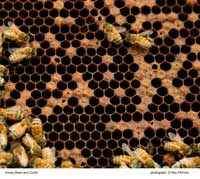Honeybees arrive at Edmonds College
05/13/2011
Edmonds College welcomed two colonies of honeybees to campus in in April as part of its Earth Month celebration. The two hives are located near the college’s vegetable garden. To learn more about the honey bees on campus, join the college for a screening of "Tales From the Hive," 11:30 a.m., May 18, in Brier Hall 185. The NOVA film chronicles a year in the life of a honeybee colony.
 |
|
Bees and Comb, by photographer Ray Pfortner (an ArtsNow instructor at Edmonds College)
|
The honey bees will be available to assist with research projects for the college’s biology department, provide service-learning opportunities, and will provide hands on experience for a new Beekeeping 101 class this summer.
Chemistry instructor Mary Whitfield, a hobbyist beekeeper at her home in Seattle where two hives are allowed per home within the city limits, helped bring the honeybees to campus.
“Declining bee populations and the potential impact on agriculture has been in the news, and more people are becoming interested in beekeeping,” Whitfield said. “Given that our college has recently adopted sustainability as part of its philosophy, I thought it was the right time to try this project on campus. So far the response has been very positive. The biology and horticulture departments are getting involved, and I hope to get a bee club started next year. We haven’t made plans for the honey yet, but I'm hoping that the Culinary Arts students will come up with some delicious new creations."
Beekeeping 101, an Apprentice Washington State Beekeepers Association course, with hive-side, hands on experience will be held 6:30-8:30 p.m., Tuesday, July 12-Aug. 16 (except July 26) in Woodway Hall 105 at Edmonds College. $125. Beekeepers Jeff Thompson and Pete Wolcott teach the class. The labs will include hive side inspections and participants will have a chance to collect honey from the hive and help with extracting.
For more information about the class, go to /artsnow or call 425.640.1423.
Facts about Edmonds College’s honeybees:
• The honeybees may travel up to two miles in search of food.
• Honey can be harvested from the hives once or twice a year; the college’s hives may produce as much as 40-50 pounds of honey per hive.
• The starter honeybee colonies cost $80 each and the hives and set up equipment about $400.
• The honeybees come from California, where bees are seasonally in demand to pollinate the state’s extensive almond crops.
• Maintaining the honeybee colonies will take about an hour a week to inspect the condition of the hive and make sure the queen is laying. Instructional tech Caroline Mann will tend the college’s bees.
• Each hive has a starter colony of 10,000 bees including a queen. The colonies could produce honey in time for a fall harvest.
Students at Edmonds College may expect to see more bees on campus and are advised to be careful when barefoot. Honeybees travel in a swarm to move to a new location if they outgrow their hive or dislike their home. They will rest in a swarm and send scouts out to look for a new home. Bees are typically docile when swarming. Spot a swarm? Call 425.640.1272.

